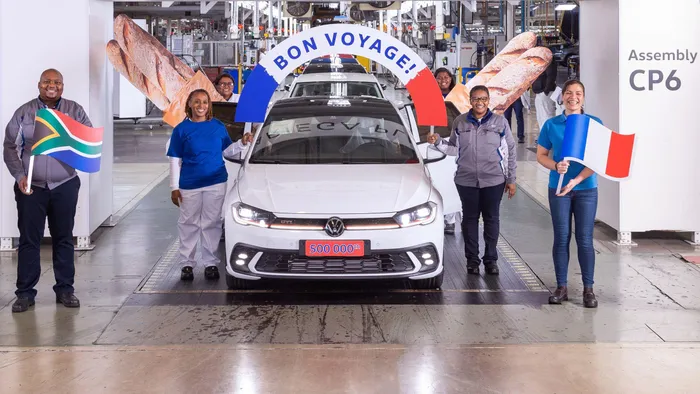
The Volkswagen Polo is South Africa's biggest automotive export, but exports to Europe remain in jeopardy.
Image: Supplied
South Africa’s vehicle manufacturing industry faces numerous existential threats, from US tariffs to Europe’s shift to electric vehicles, cheap Chinese imports and numerous speed bumps on the local front, such as high electricity costs and port delays.
Automotive CEOs such as Ford SA’s Neale Hill and Toyota’s Andrew Kirby have previously warned about the challenges facing the local industry, with the latter sounding the alarm over the gradual deindustrialisation of our industry.
VWSA’s Managing Director, Martina Biene, has also been vocal about the threats facing the sector. In a recent Investec podcast hosted by well-known presenter Marius Roberts, she outlined the importance of maintaining the country’s competitiveness as an exporter.
Following the end of apartheid, government policies such as the Motor Industry Development Programme (MIDP) encouraged manufacturers to transition from inefficient low-volume assembly of numerous models to high-volume exporters of rationalised line-ups. As a result, the local industry today exports over 300,000 vehicles per year. Volkswagen SA is currently the most prolific of these, shipping over 131,000 Polos abroad in 2024, after the Kariega plant became the world’s main production hub for this vehicle.
ALSO READ: From humble beginnings to major exporter: how SA's car manufacturing sector evolved over 100 years
However, the future remains uncertain, with Volkswagen likely to discontinue the Polo in major global markets by the end of this decade, with no replacement export programme currently in sight. While VWSA is planning to produce a new Polo-based SUV called the Tengo from 2027, this project is not currently earmarked for European export.
“Everyone was kind of guided into exports (after the end of apartheid), and this is now becoming difficult, because Europe is changing to electric vehicles, and this is one of our most prevalent export destinations. There is not really a policy in place for the domestic market for South Africa to also move towards electric vehicles. It also might not make a lot of sense,” Biene said.

Martina Biene, Chairperson and Managing Director of Volkswagen Group Africa.
Image: Supplied
She said this policy gap complicates long-term planning, as manufacturers need to consider whether it’s worthwhile retooling for electric cars when there is no local demand or incentives for such vehicles.
“And now when we pitch an idea, my biggest competition is not my eight (local) colleagues, my biggest competition is internally another 110 Volkswagen plants, and they all have good ideas of where Volkswagen could spend money.”
Biene said that while the cost of labour was still an advantage for local exporters, future wage negotiations could pose a threat, and in the last 30 years, competition from other countries with low labour costs, such as China and India, has intensified. While loadshedding has improved, the Kariega plant still faces frequent electricity outages, and the shipping in of parts and components also eats into the price competitiveness.
“Sometimes it feels like this huge advantage from the past is not there anymore,” Biene added.
She said South Africa had a good programme for incentivising local production, but ideally it needs revision. For instance, it generates rebates for importing the models which are not locally produced, but manufacturers can’t fully utilise these because the domestic market is so small.
“So if we could just revise this South African Automotive Masterplan 2035 a bit, and if we really could acknowledge that local manufacturing is doing more for communities in the country and rather work on that to make it more attractive, to probably cover some additional cost or to make it more attractive for a consumer to buy a local product, and I think just convince consumers of that in their daily process,” Biene said.
She said a recent Volkswagen survey of local car buyers was a wake-up call as it emerged that most buyers did not know that the Polo was produced locally.
Biene does not believe that tariffs present an ideal answer, as these can lead to retaliation from other export markets.
“I’m probably less on the protectionist side, because that has a ripple effect – the next country also puts duties, then the next one. In the end we’ll all lose,” says Biene. The danger is a trade war where everyone ends up paying more.”
In the same interview, Dunlop SA CEO Lubin Ozoux said that any such protective measures should be complemented by local competitiveness.
“Local producers must streamline and innovate. But when they have done so, they expect the government to crack down on illegitimate import practices that undermine local businesses. A consistent, fair enforcement of trade rules will be key.”
But what about exports into Africa through the African Continental Free Trade Area (AfCFTA)?
While Biene acknowledges that Africa does offer a huge opportunity as a new car market, the entire Sub-Saharan Africa region outside South Africa sees annual new vehicle market amounts to just 110,000 vehicles per year. This is largely because the market is flooded with affordable used vehicles from overseas.
IOL Motoring
Related Topics: